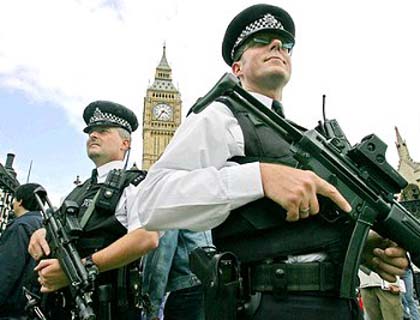The brilliant history of British police, established under the Metropolitan Act 1829 by Sir Robert Peel has recently become the centre of debate across Europe, when the corruption and racism cases of its officers were reported in local newspapers. These and other cases of abuse disappointed civil society and business communities of the country. Police lost the trust of community and community started distancing itself from the community policing process.
Community leaders believe that Britain's police is just running here and there, making noise to show they are actively pursuing criminal elements, while, in reality, they have failed in providing a good service to the community. The police have collectively failed in countering multicultural crimes in cities and towns. They need to respect colors, culture and way of life.
The changing attitudes and behaviors of the police officers which mounted to discrimination through prejudice and racist stereotyping remain disadvantage for communities. The culture of institutional concordance, police community connections and social harmony has been in trouble since the London bombing in 2005 and 2007.
Police intelligence agencies is too weak as they don't know about the thousands illegal immigrants living across the country since 5 to 15 years. The police and its intelligence have so for badly failed in bringing these people into their record. The UK Border Agency arrest illegal people, deport them to their countries, but with a month they come back, there is no clear strategy for tackling criminal mafia groups.
Home office claims that policing has undergone a transformation over recent years and it has responded to social changes and rising public expectations, but communities have complaints against the police behavior and their way of tackling suspects through counter terror laws.
How can we accept that police service has made significant progress, when it failed in tackling the recent riots in London in which they demonstrated in a less professional way? Another irony is that the police do not properly respond to the complaints of communities and keep them in long wait during complaints registration process. In many occasions they don't reach the crime scene on time.
Social and administrative connection between the police and communities is weak and based on misunderstanding. We remember the statements of politicians and public leaders pinpointing the flawed crime strategies of the UK police over the last five years.
On council level these and other issues are being tackled through various organizations, while their results have always been contradictory. Funds are released to the NGOs, community groups and religious clerics for bringing about concordance and harmony to society, but in spite of all these efforts, criminal culture prevails, intolerance is in increase and racism has targeted several government and private institutions, including the police. This wrongly understood way of maintaining law and order and community trust, undoubtedly, has left adverse effects on society.
Serious Organized Crime Agency (SOCA) has now tired in tackling the corruption cases of the police department day and night. According to a Guardian report, information on the police corruption cases is always kept in secret. The recent telephone espionage and hacking cases created more skepticism about the credibility of the police, specifically, New Scotland Yard.
The corruption stories of police officers and their arrest in the hands of their colleagues have left an ugly blot on its record. There are many cases in which police have arrested their colleagues in corruption cases. The newly appointed commissioner of the UK police accepts that corruption is "in no way endemic" in the force.
He admits that his force is facing a challenging time following the abrupt resignation of commander, Sir Paul Stephenson and his subordinate, John Yates over the phone espionage and corruption scandals. The Independent Police Complaints Commission (IPCC) has recently published a comprehensive report regarding the corruption of the UK police officers.
The report admits that allegations of corruption against the police officers severely damaged its reputation. The above mentioned non-professional way of tackling crime and Jihadism resulted in the spread of violent extremism across the country.
Last week, six British national of Pakistani origin were arrested by counter terrorism department in Birmingham in relation to their anti state activities. In Northern Ireland, three men were questioned after police recovered a bomb.
Every week and every month violent extremist are arrested and released shortly. Britain has become the centre of world's most dangerous terror groups and more than 400 war criminals who often threaten their opponents by e-mail letters, telephone in cities and towns. Security agencies and the police have been less successful in countering their unlawful activities.
Racism has badly damaged the police department.
Ethno Research and Consultancy in its survey support my argument about racism and race equality. In his Daily Mail article, James Slacks is right in saying that: "Tolerance was clearly never meant to mean that Britain should allow those with roots outside the country to flout human rights and the laws of the land on the pretext that things were done differently where they came from."
This country was founded on cultural diversity, but colors still need to be mixed. Though British society is colorful and beautiful, but each color confronts another. Tolerance is disappearing, extremist tendencies prevail and racism has become a cancerous disease.
Minority communities and white working class complain that they have not been heard properly. The relationship of communities and the police must be harmonious. The trust of the community should be restored because poor communication has been part of the problem.
There are many unresolved issues the police still needs to tackle professionally. If the police cannot guard a small country,like Britain with more than 39 constabularies, 136,365 officers, 16,200 Police Community Support Officers and 75,408 other staff across England, how the hopes of good governance peace and crime free society can be accomplished. The ineffective policies of some politicians, community leaders, religious clerics and extremist groups are leading British society towards social disintegration.

